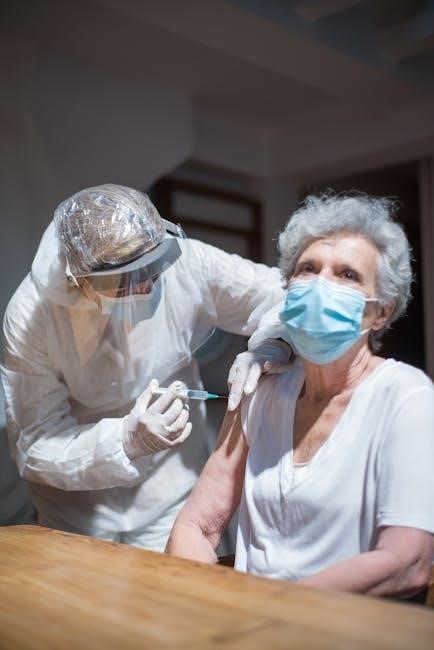Nursing roles involve caring for patients, promoting health, and preventing illness․ Responsibilities include documenting patient histories, collaborating on care plans, and advocating for patient well-being․ Nurses play a vital role in healthcare systems by providing holistic care and supporting ethical practices․
1․1․ Definition and Overview of Nursing Roles
Nursing roles encompass a broad range of responsibilities focused on patient care, health promotion, and illness prevention․ Nurses act as caregivers, educators, and advocates, working collaboratively with healthcare teams․ Their roles vary from direct patient care to advanced practices, such as nurse practitioners and mental health specialists, all aimed at improving patient outcomes and upholding ethical standards in healthcare․
1․2․ Importance of Nursing in Healthcare Systems
Nurses are essential in healthcare systems, providing primary care, developing health strategies, and ensuring patient well-being․ Their roles in documentation, holistic care, and ethical practices are vital; Nurses advocate for patient rights, promote safety, and collaborate with healthcare teams to improve outcomes․ Their contributions are fundamental to the effectiveness and compassion of healthcare systems worldwide․
Core Responsibilities of Registered Nurses
Registered nurses assess patients, plan care, administer medications, and document progress․ They collaborate with healthcare teams, advocate for patients, and ensure safe, effective, and compassionate care delivery․
2․1․ Patient Assessment and Care Planning
Registered nurses conduct thorough patient assessments, gathering medical histories and symptoms․ They collaborate with teams to develop personalized care plans, addressing physical, emotional, and social needs․ This process ensures tailored interventions, promoting optimal outcomes and patient-centered care․ Accurate documentation and continuous evaluation are essential for effective care planning and coordination․
2․2․ Administering Medications and Treatments
Registered nurses are responsible for accurately administering medications and treatments as prescribed by physicians․ This includes preparing medications, ensuring the right dosage, and monitoring for adverse reactions․ Nurses also educate patients about their medications and potential side effects, while adhering to safety protocols and legal guidelines to ensure safe and effective care․
2․3․ Monitoring Patient Progress and Documentation
Nurses continuously monitor patients’ conditions, tracking progress and responses to treatments․ Accurate documentation of observations, vital signs, and care outcomes is essential․ This ensures continuity of care and legal accountability․ Nurses update records promptly, reflecting any changes in patient status or interventions, and use this data to inform future care decisions and improve patient outcomes effectively․
Advanced Nursing Roles
Advanced nursing roles include nurse practitioners and advanced practice nurses, who handle complex patient care, leadership, and specialized tasks․ These roles require additional education and skills․
3․1․ Nurse Practitioners and Their Responsibilities
Nurse practitioners (NPs) provide advanced patient care, including diagnosing illnesses, prescribing medications, and developing treatment plans․ They conduct physical exams, review medical histories, and specialize in areas like pediatrics or gerontology․ NPs often work autonomously or collaboratively with physicians, focusing on holistic care and health promotion․
3․2․ Role of Advanced Practice Nurses (APNs)
Advanced Practice Nurses (APNs) provide specialized care, including complex assessments and high-level decision-making․ They often lead in clinical research and education, contributing to nursing practice advancements․ APNs collaborate with healthcare teams to improve patient outcomes and may take on leadership roles in shaping clinical guidelines and policies․

Specialized Nursing Roles
Specialized nurses address specific patient needs, such as mental health or community care․ Their roles involve tailored interventions, education, and advocacy, ensuring holistic patient support․
4․1․ Mental Health Nursing Responsibilities
Mental health nurses specialize in caring for patients with psychological disorders, providing therapy, and administering medications․ They assess mental states, develop care plans, and educate families․ Their role includes promoting emotional well-being, ensuring patient safety, and collaborating with healthcare teams to address complex mental health challenges effectively․
4․2․ Community and Public Health Nursing Roles
Community and public health nurses focus on preventing diseases and promoting health at a population level․ They conduct health screenings, educate communities on wellness, and develop strategies to reduce health disparities․ Their role emphasizes outreach, collaboration with local organizations, and addressing environmental and social factors impacting health to improve overall community well-being․

Ethical and Legal Responsibilities
Nurses must uphold ethical standards, ensuring patient confidentiality and privacy․ They are legally bound to follow professional codes, promote safety, and maintain integrity in all interactions․
5․1․ Confidentiality and Patient Privacy
Nurses must maintain patient confidentiality, ensuring personal and medical information remains secure․ Adhering to legal standards like HIPAA, they protect privacy rights․ Breaches can lead to legal consequences․
5․2․ Ethical Decision-Making in Nursing Practice
Nurses face ethical dilemmas requiring sound judgment and adherence to professional codes․ They balance patient autonomy, beneficence, and justice, ensuring decisions align with ethical standards and patient needs, fostering trust and integrity in care delivery․

Leadership and Management in Nursing
Leadership and management in nursing involve guiding teams, coordinating care, and ensuring efficient healthcare delivery․ Charge nurses plan assignments, assist staff, and arrange schedules, fostering a collaborative environment for optimal patient outcomes and team support․
6․1․ Role of Charge Nurses in Patient Care Coordination
Charge nurses coordinate patient care by planning assignments and arranging staff schedules․ They assist in care planning, ensure efficient workflow, and act as liaisons between medical and nursing teams․ Their leadership fosters collaboration, ensuring high-quality care and addressing patient needs effectively while maintaining a safe and organized healthcare environment for optimal outcomes․
6․2․ Nursing Leadership in Healthcare Teams
Nurse leaders inspire and guide healthcare teams to achieve optimal patient outcomes․ They foster effective communication, make informed decisions, and create a collaborative environment․ By empowering team members and advocating for patient-centered care, nurse leaders ensure high-quality services and promote a supportive workplace culture, enhancing both patient satisfaction and team performance․

Educational and Professional Development
Nursing requires continuous learning and skill enhancement to stay updated with healthcare advancements․ Education shapes nursing practice, ensuring nurses deliver evidence-based care and adapt to evolving patient needs effectively․
7․1․ Continuous Learning and Skill Enhancement
Continuous learning is vital for nurses to stay updated with medical advancements and technologies․ Ongoing education ensures competency in evidence-based practices, enhancing patient care quality․ Nurses must pursue professional development through workshops, certifications, and higher education to meet evolving healthcare demands and maintain ethical standards in their practice․

7․2․ Role of Education in Shaping Nursing Practice
Nursing education forms the foundation of professional practice, equipping nurses with the knowledge and skills to deliver high-quality care․ Educational programs emphasize clinical expertise, ethical decision-making, and patient advocacy․ By fostering critical thinking and adaptability, education prepares nurses to meet diverse healthcare challenges and contribute effectively to interdisciplinary teams, ensuring safe and compassionate patient care․
Collaborative Roles in Healthcare
Nurses collaborate with healthcare teams to ensure comprehensive care, sharing expertise and coordinating efforts to achieve common goals and improve patient outcomes․
8․1․ Interdisciplinary Collaboration in Patient Care
Nurses work alongside doctors, therapists, and specialists to deliver coordinated care․ Collaboration ensures comprehensive treatment plans, improves communication, and enhances patient outcomes․ Effective teamwork fosters a holistic approach to addressing patient needs, promoting safety and efficiency in healthcare settings․ This collective effort is essential for achieving optimal results and meeting the complex demands of modern patient care․
8․2․ Communication with Other Healthcare Professionals
Clear communication between nurses and other healthcare professionals is crucial for effective care․ Active listening, precise documentation, and timely updates ensure seamless coordination․ Nurses use tools like EHRs to share patient information accurately․ Effective communication fosters teamwork, reduces errors, and enhances patient safety, ultimately contributing to better health outcomes and improved care quality․
Advocacy and Patient-Centered Care
Nurses advocate for patients’ rights, promoting health and well-being․ Patient-centered care involves tailoring care to individual needs and preferences, ensuring respectful and compassionate support․ This fosters trust and better outcomes․
9․1․ Promoting Patient Health and Wellbeing
Nurses play a crucial role in promoting patient health and wellbeing by educating individuals on preventive care and healthy lifestyles․ They address physical, emotional, and social needs, fostering holistic care․ Through advocacy, nurses empower patients to make informed decisions, enhancing overall health outcomes and quality of life․ This supportive approach ensures comprehensive and patient-centered care delivery․
9․2․ Advocating for Patient Rights and Safety
Nurses are committed to safeguarding patient rights and ensuring safety․ They act as patient advocates, addressing concerns and upholding ethical standards․ By monitoring care quality and reporting risks, nurses protect patients from harm․ Their role in ethical decision-making ensures that patients receive respectful, individualized care, aligning with legal and moral responsibilities to prioritize patient welfare and dignity․

Technological Advancements in Nursing
Technological advancements in nursing include the use of Electronic Health Records (EHRs), telehealth platforms, and wearable monitoring devices․ These tools enhance patient care, improve documentation accuracy, and streamline communication, fostering better patient engagement and overall care quality․
10․1․ Use of Electronic Health Records (EHRs)
The implementation of Electronic Health Records (EHRs) has revolutionized nursing practice by streamlining patient data management․ EHRs enable nurses to access real-time patient information, enhancing accuracy in documentation and care planning․ They improve communication among healthcare teams, reduce errors, and support clinical decision-making․ EHRs also facilitate better tracking of patient progress and adherence to treatment plans, ultimately improving overall patient care quality and outcomes․
10․2․ Impact of Technology on Nursing Practice
Technology has transformed nursing practice by enhancing patient care efficiency and accuracy․ Tools like telehealth and wearable devices enable remote monitoring, improving chronic disease management․ Automated systems reduce documentation time, allowing nurses to focus on direct patient care․ Technology also supports evidence-based decision-making and fosters interdisciplinary collaboration, ensuring safer and more personalized care․ Nurses must adapt to these advancements to meet evolving healthcare demands effectively․

Global Perspectives on Nursing Roles
Nursing roles vary globally, with responsibilities shaped by local healthcare systems, cultural norms, and resource availability․ Nurses worldwide focus on patient care, education, and community health promotion․
11․1․ Nursing Practices in Different Countries
Nursing practices vary globally, reflecting local healthcare systems and cultural values․ In the UK, nurses focus on community health and mental health care, while in Finland, they emphasize technology integration․ Education levels and roles differ, with some countries requiring advanced degrees for specialized positions․ These variations highlight the diversity of nursing practices worldwide․
11․2․ Challenges and Opportunities in Global Nursing
Global nursing faces challenges like workforce shortages, cultural differences, and varying regulations․ Opportunities arise through technology adoption, international collaboration, and standardized education․ These dynamics shape nursing practices, fostering innovation and addressing healthcare disparities worldwide․

Future Trends in Nursing Roles
The future of nursing emphasizes telehealth expansion, personalized care, and AI integration․ Nurses will focus on preventive medicine, population health, and interdisciplinary collaboration, shaping modern healthcare delivery․
12․1․ Emerging Roles in Healthcare
Emerging roles in healthcare include nurse navigators, telehealth nurses, and genetic nurses․ These roles focus on patient advocacy, technology integration, and personalized care․ Nurses are increasingly involved in preventive medicine, chronic disease management, and mental health support․ The rise of AI and data analytics is reshaping nursing practices, emphasizing evidence-based care and interdisciplinary collaboration to meet evolving patient needs effectively․
12․2․ Adaptation to Changing Healthcare Needs
Nurses must adapt to evolving healthcare demands, such as technological advancements and rising chronic diseases․ They are increasingly integrating telehealth, AI, and data analytics into practice․ Continuous training and flexibility are crucial to address new challenges, ensuring patient-centered care remains a priority amid shifting healthcare landscapes and public health needs․

